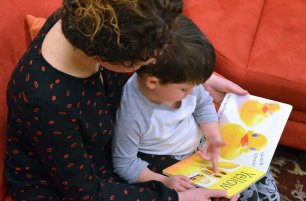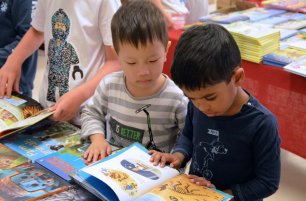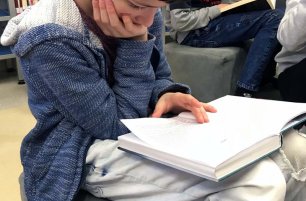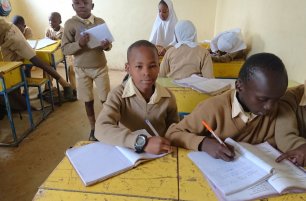Reading from a Young Age Matters
A picture is the first content of a book that a child can „read“. Thanks to pictures, a child can understand a story without knowing how to read, interpreting the main figures/animals, the environment, and the situations from the visuals. From illustrated facial expressions and body language the child can also tell emotions.
Enjoying a good book raises a love and passion that is necessary for prereading skills.
Letters all around your home
Babies a few months old can differentiate shapes. For them letters are simply another shape like a triangle, tree or a sun. Try to include them in your home as much as possible. How?
-
Decorate your home with 2 letters, after some time change one for another one.
-
Arrange letters using carrot or cucumber peels while preparing vegetables with your child.
-
Draw letters in sand.
Rhyme as much as possible
A large knowledge of nursery rhymes helps children realize that words are made up of separate sounds.
-
Read illustrated books with your child from an early age – describe pictures, shapes, colours, and emotions.
-
Find, describe and match objects that rhyme such as spoon - moon, cat - hat, dog - frog.
-
Enjoy nursery rhyme books such as "Brown Bear, Brown Bear, What Do You See?", "The Going to Bed Book", "The Snail and the Whale", ...
Use baby sign language
Support your child in being an active reader or a communication partner by teaching them baby signs. Baby signs are simple gestures substituted for words. Mastering baby signs helps the child to build self-esteem and increases the joy of being able to express themselves.
Around 1 year, your child will be able to „tell“ you that he/she sees a cat, sun, wants to drink milk or feels pain. ”Baby signers show early signs of loving books and they are able to master prereading skills at early age.“
So, let your child jump onto your lap and read together! Such moments significantly help to develop:
-
Attention: giving children face to face interaction and being playful helps children pay attention better and longer.
-
Bonding: learning and memory are enhanced in a secure and loving environment which positively influences the primal parts of a child’s brain.
-
Communication: loving communication with your child increases their ability to speak and read soon
Lenka Míkovcová – IMSP Primary Teacher Assistant
Want to learn more? Read our next article:
ABSORBENT MIND – A KEY PRINCIPLE IN MONTESSORI

References:
- Bright from the start, Jill Stamm, PhD, Paula Spencer, Gotham Books, 2007
- Baby Minds – Linda Acredolo, Susan Goodwyn / Bantam Books, 2000








